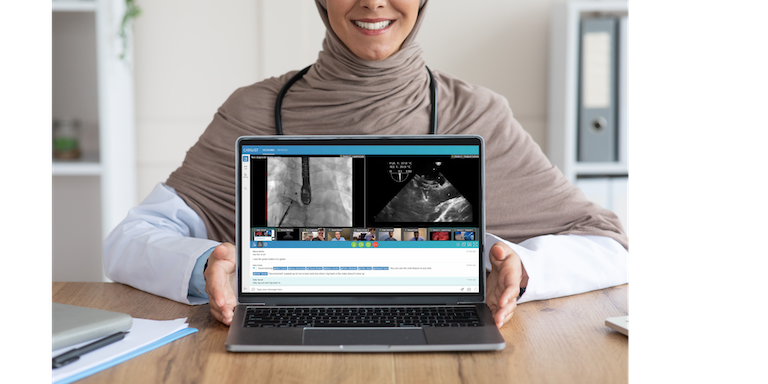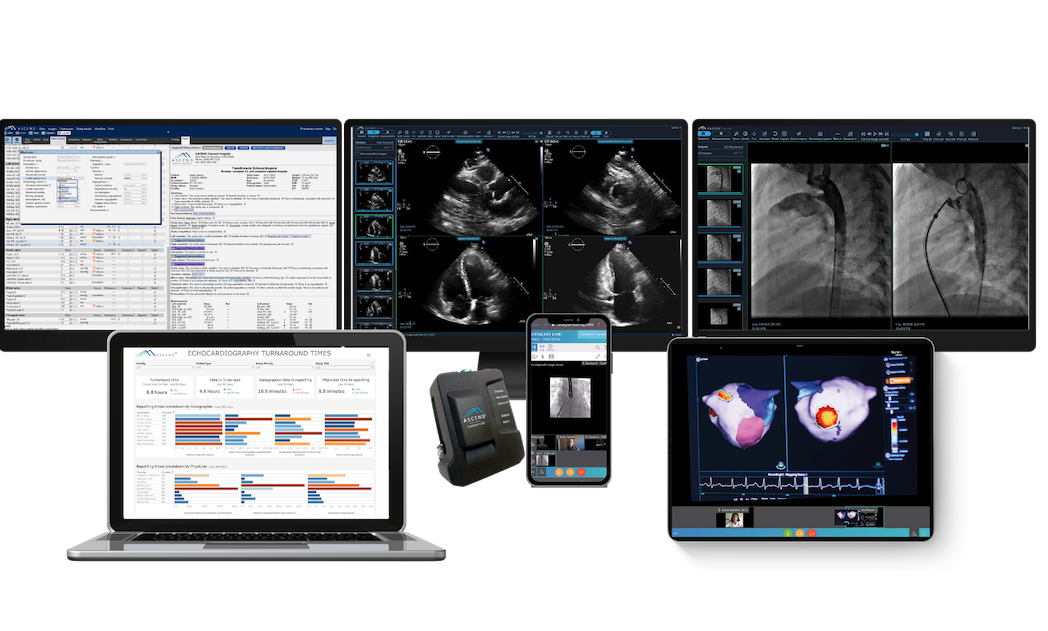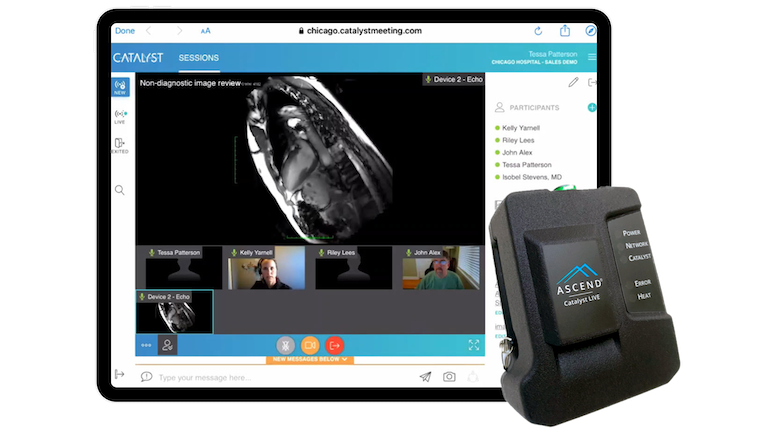
Providing exceptional cardiovascular care for patients to achieve the best possible outcomes is the number one goal for cardiologists, hands-down. However, it is also one of their biggest challenges. Why is that?
To start, today’s cardiovascular IT landscape remains fragmented, meaning care providers typically rely on multiple specialized applications to address the unique needs of each procedure type. Not only does this result in a cumbersome and inefficient workflow, as cardiologists must bounce between systems and locations to retrieve and compare relevant prior and current multi-modality information, it can also result in critical information gaps that have a direct, negative impact on patient care and outcomes.
Additionally, while Cardiovascular Information System (CVIS) solutions that boast multi-modality solutions might provide the core tools necessary for mainstream reading and reporting, they still lack the specialized tools and workflows necessary to seamlessly leverage proven advanced visualization or AI workflow tools, or provide continuity of care across a patient’s entire lifespan — from pediatrics throughout adulthood.
The best possible outcome of this situation is inefficient workflow, driving higher overall cost of care and resulting in widespread physician and patient frustration. However, the more troubling result is reduced quality of care, leading to delayed or inaccurate diagnosis for patients.
What is the solution? Helping the provider community improve cardiovascular care requires a solution that can unify and organize images, information, and workflows across diverse cardiovascular specialties, and services patients of all ages and profiles. Such a solution would provide physicians with a complete view of their patients’ clinical context to drive evidence-based care and improved outcomes, while simultaneously creating a seamless and efficient workflow that reduces time and cost of care — a win/win/win for patients, care providers, and healthcare organizations alike.
The Future of Cardiovascular Workflow
Led by a practicing cardiologist, and with well over two decades of experience in developing and implementing cardiovascular IT solutions, ASCEND Cardiovascular not only understands, but has experienced many of these challenges first-hand. This is what fuels the company’s mission: to improve cardiovascular care and patient outcomes through intelligent solutions and seamless integration.
To this end, ASCEND provides the tools that not only address the unique needs of each cardiovascular subspecialty and to care for patients from infancy into their golden years, they also innovates next-generation solutions and services that empower the provider community to truly transform their cardiovascular services.

Complete Cardiovascular Workflow
Already driving cardiovascular workflow for many leading Cardiology PACS and EHRs, ASCEND’s flagship solutions provide the industry’s first complete solution for enhanced cardiovascular care. This includes:
• ASCEND CV, a smart multi-modality structured reporting solution that anticipates modality-specific workflows covering all invasive and non-invasive procedures.
• InView, an intelligent AI-driven diagnostic viewer that simplifies multi-modality image review and prior comparisons and provides a collection of tools to automate and augment report creation.
• Catalyst LIVE, using live-streamed audio, video, and direct-from-modality imaging feeds, Catalyst LIVETM gives care providers the flexibility to collaborate at any time, from anywhere to enable faster, more effective decision making.
• ASCEND Analytics, an open-schema data warehouse that seamlessly integrates with EHR, HIS, medical devices, and other systems to deliver rich, structured cardiovascular data that drive targeted improvement programs, identify patient cohorts for procedure candidacy (e.g., TAVR) or quality studies, and forecast case volumes and inventory/resource needs.
Intelligent AI-driven Workflow
ASCEND’s AI-driven image viewer, InView, provides an intelligent, highly effective solution for echo, vascular and cath reading and reporting. Using a combination of native machine learning and integrated AI applications, InView automates and accelerates multimodality image visualization, prior comparison, and structured report creation.
Using machine learning algorithms, InView’s Categorical Hanging Image Protocol(CHIP) automatically organizes images by anatomy and pathology categories to intelligently display or “hang” current and prior studies in a way that significantly improves the efficiency of single or multi-modality image review. Rather than viewing images in acquisition order, which is not always consistent with imaging protocols, cardiologists can define hanging protocols that reliably display images according to relevant categorical attributes. CHIP also can retroactively classify prior images to simplify and accelerate prior comparison workflows — saving time, while also elevating the accuracy of diagnostic interpretation.
“ASCEND Cardiovascular’s sole purpose is to help the provider community improve cardiovascular care. With CHIP, cardiologists will be able to interpret TTE (Transthoracic Echo) studies more accurately and efficiently than ever before,” says ASCEND CEO Dr. Jeff Soble.
In addition to native AI, InView also integrates with third party algorithms to further enhance reading and reporting workflows for specialized procedure and patient types. For example, by integrating Ventripoint’s AI-powered heart-scanning technology, which turns ultrasound images of the heart into MRI-quality heart images, InView provides pediatric cardiologists with access to MRI-quality heart images at a fraction of the cost and time needed for traditional MRIs. As well, by incorporating Us2.ai’s echocardiogram algorithms, which automate measurements and pre-populate structured report templates, InView eliminates manual steps and improving the speed of coordination-of-care for patients with suspected heart disease.
Be There, Without Being There with Live Telepresence
Recognizing that collaboration is at the heart of clinical decision making, ASCEND has introduced Catalyst LIVE, a vendor neutral telepresence solution that uses real-time audio, video, and streaming from imaging and physiologic devices to create an immersive environment that allows remote care providers to interact as if they were standing side-by-side, ensuring timely decision making and effective collaboration for the entire care team across routine and complex care environments.

Already launched at some of the leading academic and pediatric hospitals in the United States, Catalyst LIVE supports a wide variety of collaboration workflows and use cases, including:
• Remotely participate in, or proctor interventional and surgical procedures such as interventional cardiology, electrophysiology, surgery and hybrid intervention, intensive care, and more.
• Virtually guide sonographers and technologists during complex image acquisitions like cardiac CT or MRI, fetal or pediatric echo, intraoperative TEE, and more.
• Fully engage remote, multi-disciplinary participants in live meetings and case reviews to support continuous quality improvement and interactive training.
A Look into the Future with Augmented Reality
Extending upon the benefits of virtual telepresence, Catalyst is currently piloting the use of augmented reality (AR) to create an even more immersive experience for cardiology professionals.
When integrated with imaging sources, AR glasses provide the ability to overlay relevant information directly within the clinician’s field of view. This provides immediate, distraction-free access to key patient data or images during complex procedures and allows specialists to virtually participate during remote surgeries or interventions by offering live guidance to local clinicians.
As well, when integrated with Catalyst LIVE allows care providers to access multimedia data sources such as patient records, live audio and video feeds, or remote imaging streams – allowing healthcare providers to immerse themselves in lifelike environments, further enhancing collaboration and decision-making or facilitating enhanced training and education by simulating realistic medical scenarios that allow students to experience a wide range of cases first-hand.
While still only in the pilot stage, these AR glasses are providing a look into the future and the possibilities that lie ahead.
Connect at ACC.24
ASCEND CV will be showcasing its complete solutions for enhanced cardiovascular workflow at the American College of Cardiology’s 73rd Annual Scientific Session & Expo (ACC.24) April 6-8, in Atlanta.
At ACC.24, the company will be highlighting its complete portfolio of solutions including:
• Smart Multi-Modality Structured Reporting
• AI-Driven Image Review
• Live Telepresence
• Augmented Reality (AR)
• Open-Schema Data Warehouse and Flexible Analytics
ASCEND’s team of specialists can provide you with a full spectrum of support and consultative services. They will collaborate with you and your team to identify opportunities for optimization and enable continuous improvement leveraging ASCEND’s workflow experts with complementary tools developed by the company.
Click here if you are interested in setting up a meeting at ACC.24.
You can also learn more about ASCEND CV’s portfolio of solutions at www.ascendcv.com.
Related content:
DAIC Thought Leadership Series: Collaboration Challenges in Complex Cardiology Settings
DAIC Thought Leadership Series: Practical Realities of Artificial Intelligence in Echocardiology


 July 31, 2024
July 31, 2024 









